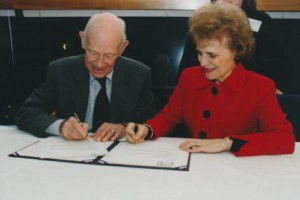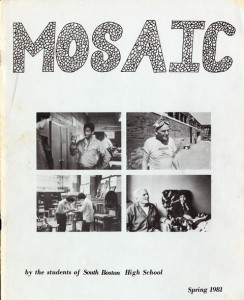
Judge W. Arthur Garrity signing the deed of gift for his chamber papers with UMass Boston Chancellor Sherry Penney. As a result over 60 boxes of files from the 1972 desegregation court case, Morgan v. the Boston School Committee, were donated to the Joseph P. Healey Library. Archivist Elizabeth Mock in background.
Busing is in the news.
And for good reason. It was 40 years ago this month that court-ordered busing started in Boston. Busing was an effort to desegregate public schools in Boston and Massachusetts and was the result of federal court case Morgan v. Hennigan, 379 F. Supp. 410 (1974), commonly known as the Boston Schools Case.
Morgan v. Hennigan, 379 F. Supp. 410 (1974) was a complex and legally entangled class action suit against the state of Massachusetts and the Boston School Committee that evolved from a report published in April 1965 by an advisory committee appointed by the State Board of Education and the Commissioner of Education to study racial segregation in Massachusetts’ public schools. On March 15, 1972, the plaintiffs filed a complaint with the First District Court of Massachusetts, charging the state and Boston officials with maintaining a segregated school system that denied black students equal educational opportunities. After preliminary hearings, the case went to trial before Federal District Court Judge W. Arthur Garrity, Jr., who was selected by a random process to preside over the case. The trial lasted about fifteen days and on June 21, 1974, Judge Garrity filed a 152-page opinion with the clerk of the court. In his lengthy opinion, the Judge ruled that the School Committee of the City of Boston had “intentionally brought about and maintained racial segregation” in the Boston public schools. The opinion also required the School Committee to use a temporary desegregation plan (court-ordered busing) for the 1974-1975 school year and ordered the Committee to begin formulating a permanent plan. By January 1975, the School Committee had failed to present an adequate desegregation plan to the court. As a result, the court assumed an active role in the formulation of the desegregation remedy and began to oversee implementation of court-ordered desegregation in the Boston public schools for the next fifteen years.
Last Sunday, the Boston Globe published a meticulously researched and compelling look at the history busing and school desegregation in Boston. Through interviews and archival research, the feature story explores issues of desegregation, but also broader issues of parenting and education. Earlier this month, the Herald published an opinion piece by Ray Flynn, who served as mayor of Boston from 1984 to 1993, about the busing ruling.
We have a number of collections in University Archives & Special Collections at UMass Boston that would certainly prove beneficial to researchers and writers looking at the history of busing and desegregation in Boston.
Judge W. Arthur Garrity, Jr. donated his chamber papers to University Archives & Special Collections in the Healey Library at UMass Boston on December 8, 1998. Chambers papers are the personal property of the judge, who retains the right to make the final decision regarding their preservation and management, and the papers in this collection constitute a day-to day file documentation of the Boston Schools Case.
In the papers of sociologist and academic Robert Dentler is information documenting his role in drafting a desegregation plan for Boston’s schools, as well as published articles and papers studying the impacts of busing in Boston.
University Archives & Special Collections also holds the papers of the Center for Law and Education related to the Boston school desegregation case. The center served as co-counsel for the plaintiffs.
Finally, UASC holds the records of Mosaic. Founded by Michael Tierney and Dan Terris, Mosaic was launched at South Boston High School in 1980 in response to the effects of court-ordered desegregation on the high school. Led by professional writers and photographers, students produced stories and photographs about themselves and their communities. A yearly anthology was published from 1980 to 1988.
I hope the stories keep coming.
University Archives & Special Collections in the Joseph P. Healey Library at UMass Boston collects materials related to the university’s history, as well as materials that reflect the institution’s urban mission and strong support of community service, notably in collections of records of urban planning, social welfare, social action, alternative movements, community organizations, and local history related to neighboring communities.
University Archives & Special Collections welcomes inquiries from individuals, organizations, and businesses interested in donating materials of an archival nature that that fit within our collecting policy. These include manuscripts, documents, organizational archives, collections of photographs, unique publications, and audio and video media. For more information about donating to University Archives & Special Collections, click here or email library.archives@umb.edu.
